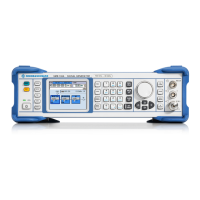R&S SMB Introduction - Maintenance and Interfaces
1407.0806.32 8.1 E-2
8 Maintenance and Remote Control
Interfaces
Introduction - Maintenance and Interfaces
The following chapter contains information on the maintenance of the signal generator and a description
of the remote control interfaces.
Please follow the instructions in the service manual when exchanging modules or ordering spares. The
order no. for spare parts can be found in the service manual.
The address of our support center and a list of all Rohde & Schwarz service centers can be found at the
beginning of the printed manual.
The service manual includes further information particularly on troubleshooting, repair and exchange of
modules.
Maintenance
The instrument does not need a periodic maintenance. What is necessary is essentially the cleaning of
the instrument. However, it is recommended to check the rated data from time to time.
Cleaning the Outside and Storing
What is necessary is essentially the cleaning of the instrument.
ATTENTION
Instrument damage caused by cleaning agents!
Cleaning agents contain substances that may damage the instrument, e.g. solvent-
containing cleaning agents may damage the front panel labeling or plastic parts.
Never use cleaning agents such as solvents (thinners, acetone, etc), acids, bases, or
other substances.
The outside of the instrument is suitably cleaned using a soft, line-free dust cloth.
The storage temperature range of the instrument is given in the data sheet. If the instrument is to be
stored for a longer period of time, it must be protected against dust.
The original packing should be used, particularly the protective covers at the front and rear, when the
instrument is to be transported or dispatched. If the original packing is no longer available, use a sturdy
cardboard box of suitable size and carefully wrap the instrument to protect it against mechanical
damage.

